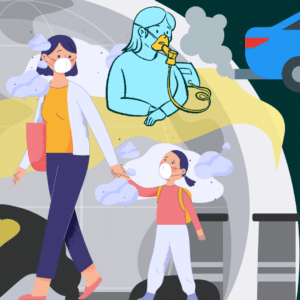Carbon Tax Impact Canada
What is the real impact of the carbon tax in Canada? The carbon tax only contributes a fraction of a percent towards inflation, even with knock-on effects, whether you’re in Alberta or Ontario, or Nova Scotia. Meanwhile 25 cents of every dollar of inflation over the past two years in Canada has gone to oil and gas and mining industry profits. What the carbon tax does do is help bring down air pollution from burning fossil fuels which has a serious benefit to people’s health in Canada. As the carbon tax increases annually, any negative financial impact will still be far less than the positive benefits.
Carbon Tax Impact on The Economy and Canadian Households
Over 200 Canadian economists back carbon pricing as having minimal economic impact, being a benefit to the climate, being the cheapest way to deal with climate change, and have confirmed that most families get more back.
Numbers you may be hearing quoted from the Parliamentary Budget Officer’s report confirm that the impact on inflation is a fraction of a percent. References to numbers on the “costs to the economy” were miscalculated and don’t account for costs of climate change (billions) or the benefits of a green economy.
Not only are the PBO’s numbers on ‘cost to the economy’ wrong, but using the PBO’s carbon tax numbers to claim the carbon tax costs the economy would be like an early 20th century person calculating the costs of moving away from an economy based on horse-drawn carriages without including the resulting benefits of having access to motorized transport. We deal with this more in the podcast below. And again no, the run on effects of the carbon prices do not add significantly more to inflation.
Climate change is already costing Canadian households billions of dollars, and people in flood prone areas will have trouble getting mortgages for their homes. Average world incomes will drop by almost a fifth within the next 26 years as a result of the climate crisis, and the costs of damage will be six times higher than the price of limiting global heating to 2C.
Health, Air Pollution, Fine Particles, and Carbon Pricing
 1 in 7 premature deaths of Canadians are due to fossil fuel particles, and carbon pricing helps prevent these deaths by diminishing the amount of fossil fuels burned.
1 in 7 premature deaths of Canadians are due to fossil fuel particles, and carbon pricing helps prevent these deaths by diminishing the amount of fossil fuels burned.
By 2018, “for every household in the BC metropolitan areas – after the carbon tax (was introduced) – we have a five per cent to 11 per cent reduction in local air pollution,” said Lorenzo Sileci, the author of the study and a post-doctoral researcher at the London School of Economics. – Global News.
And yes, fossil fuels are the cause of this pollution.
Climate Change, Renewable Energy, and CO2 Myths – does the Carbon Tax Work?
Yes, carbon pricing is a highly effective way to reduce emissions in Canada. How the tax works is covered in this podcast, also available below.
The carbon tax still works if you get more back by rebate. Here’s how:
- If you don’t switch away from fossil fuel use or use less, you still get back the rebate, which for most families is more than the cost.
- The tax is just a price signal and the rebate is there to make sure you’re not worse off financially. But you can gain even more financially by listening to the price signal and then using the money from the rebate to invest in things that lower energy use or are greener alternatives. Think of the carbon tax as a way to put a price on pollution and give the money in rebates back to low income Canadian households so they can go green since they will have the hardest time doing so.
A renewable energy transition is completely possible and people won’t freeze because of it. We deal with this in a different podcast episode.
Yes, CO2 is a pollutant in the case of climate change and human caused CO2 causes climate change – it’s not just plant food.
No, volcanoes are not to blame for more emissions that humans. Humans emit 100 times more CO2 than volcanoes.
When it comes to Canada’s wildfires last year it is NOT arson that’s to blame and the climate crisis made the spate of Canada wildfires twice as likely, read more in untangling climate misinformation around Canada’s raging wildfire.
Finally, Canada’s forests haven’t absorbed more carbon than they’ve released since 2001. Further, blaming other countries for climate change overlooks both Canada’s high per capita emissions and historical emissions that contributed to the climate crisis. We won’t inspire others to do more on climate change if we continue to contribute a lot more emissions per person than they do.
You can find more on other common climate myths at this website. And you can read more about our work on climate change on our program page.
We deal with even more aspects of carbon pricing, including details on how it works, in the most recent edition of our podcast, which you can listen to below on Youtube or on Apple Podcasts, Spotify, iHeart Radio or wherever you get your podcasts.
Listen to more on carbon pricing below!
